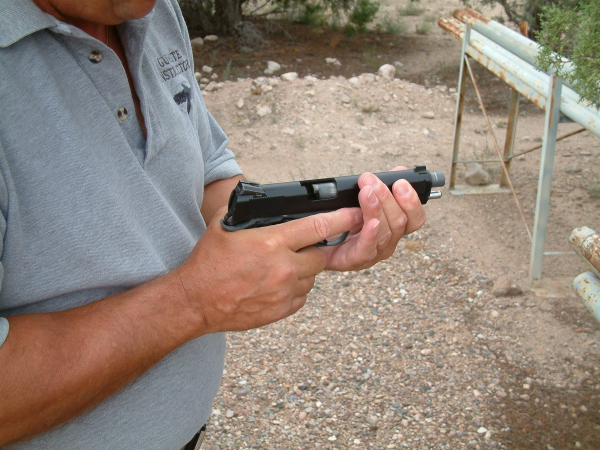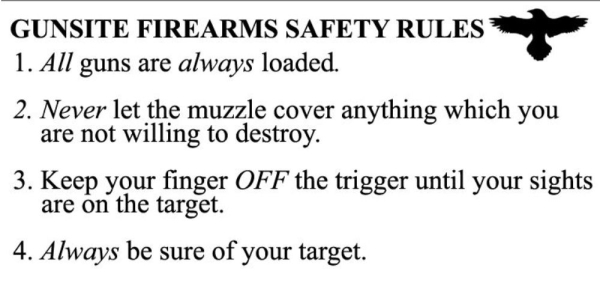This feature first appeared in The Shooting Wire…
What (sadly passes) as “news media” has presented a regular load of non-news about the heartbreaking accidental killing of Director of Photography Halyna Hutchins and critical wounding of Director Joel Souza on the set of a movie being … shot … on October 21, 2021.
A lot of the “news” coverage – which leaves out incidentals like “when-where-why-how” – centers around “who is at fault?”
We won’t dally around with that here. There’s enough heat shedding absolutely no light and we won’t add to it. As to culpability, that’s for the triers of fact, not us. There are ongoing investigations. The people and state of New Mexico have gone to a lot of time, effort and expense to enact and enable laws (civil and criminal), recruit, hire, train and deploy peace officers and county prosecutor/district attorney offices as well as an Attorney General – not to mention the potential civil litigants and their attorneys – to attempt to unravel this mess. As to the potential for the insurer of the production to investigate, quite separately, the possibility of not paying claims on the basis of any alleged failures to follow “best practices,” I’ll let those better educated consider that.

An image from a TV screen, from an old Perry Mason TV show … mind the muzzle, Mr. Berger! Below, “the Rules” as formulated by the API/Gunsite founder, Jeff Cooper.
The issue for enthusiasts – both consumers of the outdoors and shooting industries and members of those industries – is how to keep from having a #newmexicomoment of our own.
First, we don’t rely on the word or belief of others as to the condition of any firearms within our reach and grasp. We look to Jeff Cooper who came down from the mountain with the tablet upon which the first four of our Rules were imprinted.
Rule One – All guns are always loaded.
This isn’t a matter for debate or discussion. It’s not “treat guns as if” because that allows some possibility, however remote, that “Murphy” didn’t show up to mess up the works. We don’t allow for the possibility. If the chamber is flagged, the gun is field stripped into components, if it’s tagged, taped and locked open – we still follow the rest of the Rules that follow.
Because all the Rules follow from Rule One. “Which commandment, out of all of them, do we have to follow?” – Rule One.
Because all guns are always loaded, we practice muzzle discipline, Rule Two – Never let the muzzle cover anything you don’t want to destroy.

Don’t guess the gun’s condition — observing Rule Two, check the damn thing. Note the hand is behind the muzzle. Below, ensuring the gun is empty is best done twice: once by looking and again by feeling for a cartridge.
It’s not “don’t point the gun” – that’s an active and intentional act; too often, it becomes an act of carelessness, lack of discipline, allowing the muzzle to cover something we really don’t want to shoot. That’s why “holstered handguns are safe.” If it’s not in your hand, you’re not unintentionally, thoughtlessly covering something precious and important to you. So, the handgun should be (1) in the holster, (2) at a ready position with the muzzle covering the safest available direction and practicing trigger finger discipline, or (3) aimed in at an appropriate target, with an appropriate backstop, whilst in the process of shooting. Otherwise, it should be in a locked container, which we’ll get to in a moment.
As to that pesky trigger finger, the human hand is designed in such a way that when any fingers close, they all tend to close. For us, that’s a problem. When handling firearms of any type without any intention to morally, ethically and legally shoot it, the trigger finger should be “at register.” Register is the furthest point on the gun away from the trigger/trigger guard that doesn’t compromise the control of a firing grip.
Rule Three, “Keep your finger off the trigger until your sights are on the target,” was a relative late-comer to the “tablet.” When discussing the Rule (which is a mnemonic, short-hand as a reminder – not the whole Rule), I make it a point to note that we’re not touching the trigger until the muzzle is covering something we can shoot (or must shoot) and we have formed the intention to shoot; no ‘gunpoint’ allowed. Read more






